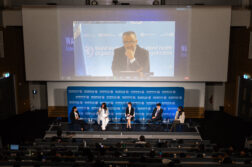We pulled up at the National Trust’s Llanhydroc house and gardens, and walked around in a clan of people into the lady’s dressing room. I envisaged the women sitting there and watching the men riding off in their horse and carts to meetings and important matters they weren’t allowed to think of. There was a portrait of the woman of the house, hanging on the faded green patterned walls above the fireplace. ‘I can’t imagine them sitting in these rooms, I wish I could let them out, somehow. All those days idly sitting around I just can’t fathom a life like that. It must have been like having chains on their feet and bars on the windows,’ I said.
‘These women weren’t repressed,’ my father answered, standing beside me blocking my view out the window. ‘Babe, they could do whatever they wanted, it was the folks down there who were bloody starving,’ he joked, as he pointed to the green hills in the distance, at the peasants who would have lived in the towns below. He walked into the next room, shaking his head. I stood with the women, frozen like them. I wanted to promise them life was different, that their pain was worth something, but I wasn’t sure it was. I felt their claustrophobia. It permeated me as if all their ghosts entered me at once.
But what hit me most of all is that I saw my mum in the room, trapped in her very own 1950s night-mare, her only job to sit and wait for my dad to come home from work. Every day she cooked, burned herself on the stove making my father’s favourite rock buns, and there she will be until she dies, still with the same slightly flattened hair and painful look in her eyes. But I couldn’t save her because she couldn’t admit she needed saving.
At last, I followed my father outside into the gardens. We walked around the fountain in a sequence where I mirrored the paths he took. We weaved in and out of the bushes in a pattern neither of us knew. I walked down the concrete steps to the lower garden, and watched him through the arched bush, fixated on a dragonfly hovering close to the water, feeling the vibrations in the space between the air. He looked like the ten-year-old version of himself I had seen in a photograph once, wearing a holed jumper and a vague, distant stare into a spot somewhere past the camera.
Since I was ten, I had been known as his daughter in the town. When I went out to pick up the Sunday pasties and Daily Mail, accepting the catcalls I was taught to take as compliments, everyone who I got served by knew me, but they knew me through him. The countless farmers would walk past me in the street, in their muddy boots and overalls, shouting ‘Alright m’darling? ‘Ansome day, ain’t it? Wasson? How’s Nige?‘ Because I have my father’s big brown eyes, that makes me his inferior replica. I am not defined by my female heritage; being my mother’s daughter is apparently unimportant.
Watching him fixated on this dragonfly, I realised that I had lost both of my parents. The man watching the dragonfly was my father, but he wasn’t the father who I had known, who walked me into the sea for the first time, lifted me up when the foam would swirl around my thighs, took me out deep and saved me from the waves when they enveloped me and I would splutter as the taste of salt stung in my throat. Nor was he the man who took me into the cold evenings wrapped in his burgundy Fat Face jumper by the fire with the crunch of off-white paper on my lap. which would layer oil from the chips onto the skin of my legs. My father was a misogynist. He was afraid of women’s power, and he was afraid of the woman I was becoming.
But it was my mother whose loss was even more painful to me. She was trapped under his power not wanting to leave and I couldn’t save her. I replayed those beach evenings where she sat on the side-lines, my father telling her she couldn’t be the one to take us out deep because it required a man to do it. I see her try to place her cream woolly cardigan over my bare shoulders to keep me warm, but my father always gets there first. She sits back.
As we drove back home in the late afternoon, I made myself a promise. As I educate myself to death in the early hours and early starts walking up to the library, opening books I realise I have access to, I keep making myself the same promise that I will never give this power back, because this power- that my mother thinks she lacks, and my father had kept from me for so long- is mine. I stole it back for me, I stole it back for her, and I stole it back for the ghosts of the women static and solitary in the rooms that we had visited that day.
I looked out of the window, and acknowledged that wherever I ended up, I know I’ll never forget my roots. I will always remember my house, my father’s workshop, the fields and straw dens and red welly boots and home-made swings and smell of peppery roasts, and the cold frost mornings and cobbled streets and farms where I was made, but these memories will be forever haunted by my mother’s face in dreams that wake me up in sweats in the middle of the night.
She will always be the ghost that will never leave me and, until I return one day, when I have worked hard and worked until I have nothing left, I shall think of her, because I am living this life for all of those women who were trapped inside their mansions and cottages, but most of all, I’m living this life for you, mum. Because to me, you are not peripheral.


